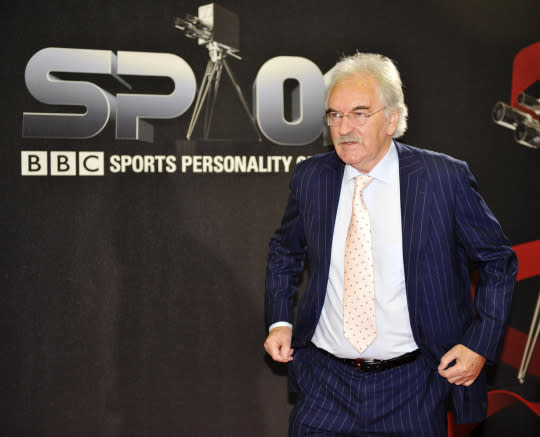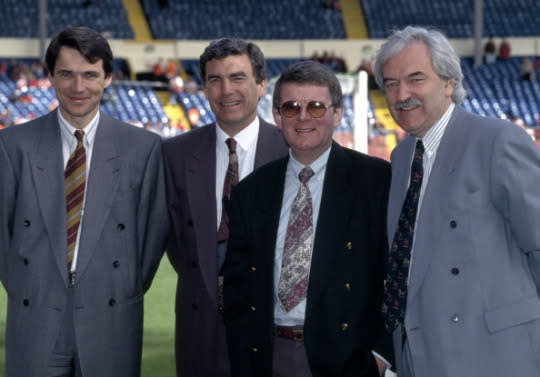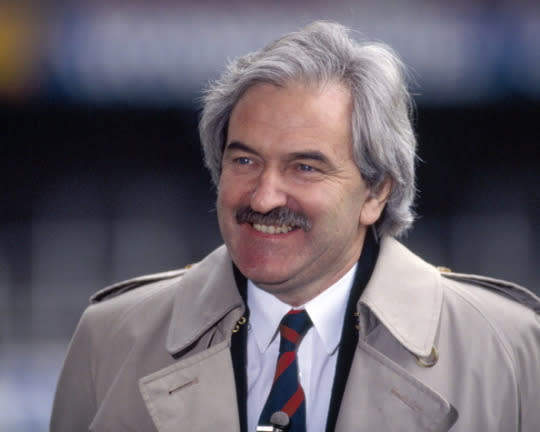Voices of Sport: Des Lynam - The silky smooth presenter with a host of memorable one liners
In our weekly series, Yahoo Sport’s Nick Metcalfe features a famous voice of sport. As the Rio Olympics come to a conclusion, Des Lynam - once the man for all big occasions - goes under the spotlight.

Oh Des. How we miss you. Can I just excuse the informal tone from the start. Let’s be honest, Des Lynam was pretty much always just ‘Des’.
He is one of the best sports broadcasters there has ever been. Truly unflappable, with a great sense of occasion and impeccable comic timing. For decades, we shared the big sporting moments with Des.
A young Lynam actually worked in the insurance business at first, but in his mid 20s he started as a freelance journalist for Radio Brighton. Typically he impressed from the start, and soon joined national BBC radio in London.
It wasn’t long before Lynam presented the main Saturday afternoon sports programme, Sport on Two. This was broadcast on Radio Two, long before the days of there being a dedicated station for sport like 5 Live. The programme included Sports Report, and that famous old tune at five o'clock.
Lynam didn’t just present sports broadcasts. Between 1974 and 1976, he co-presented the Today programme on Radio 4 three mornings a week. His voice was becoming a familiar one for millions.
While Lynam has always been associated with a number of sports, he was perhaps closest of all to boxing in the 1970s and 1980s. He was the BBC’s boxing commentator on radio for 20 years, and naturally he did the job quite brilliantly.
If Lynam was a fine radio operator, it was his many years on television that he’ll be most remembered for. He moved to TV in 1977, initially presenting the Sportswide segment in the Nationwide programme.
Television bosses quickly came to see him as a precious commodity, and Lynam became the main presenter for a number of the corporation’s most valuable programmes.
Well, they were more brands than programmes really. None more than the iconic Saturday afternoon show Grandstand, which Lynam fronted permanently from 1979 to 1991, and then on a more infrequent basis through to 1999.
This was a perfect vehicle for Lynam. On air from lunchtime to teatime on a Saturday, all year round. From Five Nations rugby at the start of the year, through to the Grand National at Aintree in the spring and then the FA Cup final, in the days when coverage of football’s big day used to start just after breakfast.
The summer meant two weeks at the All England Club and then the Open Championship, while all year round there was racing from all corners of the country, along with a number of minority sports given their precious moments in the spotlight. And from August to May, there was the football results, always an integral part of the programme.
Lynam was the picture of calm and authority throughout, making the pressures of dealing with the videprinter churning out full-time scores between 4.45pm and 5pm seem effortless. You never doubted watching at home that here was a man in total command of the programme.
Even when all hell broke loose behind him, with punches being thrown by a couple of members of the backroom team, it was revealed to be an April Fool joke, one of the finest ever on TV.
Lynam was there for some truly dramatic Saturday afternoons. Wimbledon stunning Liverpool to win the FA Cup. Scotland seeing off favourites England at Murrayfield to win the Grand Slam. Being asked to leave Aintree in 1997 due to a bomb scare.
It was all Grandstand then as you might recall. World Cup Grandstand, Olympic Grandstand. If it mattered, it tended to be branded with that mark of excellence.
There was also Sportsnight, the BBC’s midweek programme which had started out decades earlier with the great David Coleman in the hot seat. Lynam presented the show for six years in the 1990s.
Possibly the most memorable Sportsnight during Lynam’s time came in early 1995, when Manchester United star Eric Cantona kicked a supporter kung-fu style at Selhurst Park. It’s hard to believe in this era of wall-to-wall TV sport and clips appearing constantly on social media, but the first viewers saw of that infamous incident was the late night highlights on Sportsnight.
And of course there was Match of the Day, the most famous TV football programme of them all. Lynam sat in the Saturday night chair from 1988 to 1999, which coincided with the creation of the Premier League and the explosion of interest in the game.
Former Liverpool star Alan Hansen came to prominence as a pundit during that time too, and the pair became quite a double act on a Saturday night. It was Lyman asking the questons when Hansen claimed that “you can’t win anything with kids” in 1995.
The below picture shows Lynam along with Hansen, Trevor Brooking and John Motson before a 1993 FA Cup semi-final between Arsenal and Tottenham at Wembley.

Sadly, Lynam was also on duty for one of the game’s darkest days, the Hillsborough disaster in 1989, when 96 Liverpool fans died at an FA Cup semi-final between the Merseyside giants and Nottingham Forest. As with all the truly special sports broadcasters, Lynam had the necessary gravitas about him to present probably the saddest ever edition of Match of the Day.
Throughout Lynam’s time at the BBC, there were the truly special events as well, like World Cup finals and Olympic Games. And Lynam was becoming synonymous with them all.
At one time, the presentation nearly always came from a studio at home, rather than on location. At the 1988 Seoul Olympics, Lynman gave us an unforgettable Olympic TV moment.
It was towards the end of an evening highlights programme when an actual hand came into shot and gave Lynam something to read. The words were dramatic and pitch perfect.
“I’ve just been handed a piece of paper here that if it’s right, it’ll be the most dramatic story out of these Olympics, or perhaps any others. It says Ben Johnson of Canada has been caught taking drugs and is expected to be stripped of his Olympic 100m gold medal, according to International Olympic Committee sources.”
Nobody watching that night has ever forgotten it. These days, with instant news delivered to us via Twitter and the like, it’s hard to imagine we’ll ever see another moment like that.

The 1990 World Cup must rank as one of the most memorable ever televised sporting events in Britain. The quality of the football at the tournament may not have been up to much, but for spectacle and theatre that month in Italy was pretty much beyond compare.
Luciano Pavarotti’s Nessun Dorma, the BBC theme for that tournament, can still now make the hairs on the back of the neck stand up. It can take you back in an instant to that summer of Gazza’s tears and Toto Schillaci, to Jack Charlton’s Ireland and those dreaded penalties. And Des of course. He started the tournament by saying of that theme, “you’ll be humming it soon.”
Lynam actually had a rare disappointment, totally drying up for a few seconds while in Naples for England’s quarter-final clash with Cameroon. It happens to the very best of them. For the vast majority of the tournament, it was vintage Lynam.
I can see him now, introducing coverage of that titanic England v West Germany semi-final. “Three countries can win the 1990 World Cup. Argentina, West Germany… (perfectly timed pause)… and England.”
As the tournament ended, he set up one last playing of Nessun Dorma with a simple “Cue Luciano.” It’s funny how the little things stay in the heads of sports fans.
The summer spectaculars kept coming, and Des was naturally part of the package. There was the Barcelona Olympics of 1992. The World Cup in America, where Lynam flew out for the final. And then perhaps the most Des-ish summer of the lot - 1996.
First there was Euro 96 in England, the tournament when football so nearly came home. Millions tuned in for some memorable matches that June, and when they were screened on the BBC Lynam was the ideal companion.
“You’ve obviously heard there’s a football match on tonight,” he said at the start of the BBC’s coverage of England’s semi-final showdown against Germany.
By the end of Euro 96, Wimbledon was in full swing, so we had more Lynam. And just a week or so after the tennis was over, he was back again for another televisual feast, the Atlanta Olympics. Basically, Des was never off our screens that golden summer. And nobody was complaining.
There was even a TV movie, created by Arthur Smith and starring Neil Morrissey, called My Summer with Des, shown in 1998 but set in 1996. The “housewives’ favourite” Lynam - by this time all the newspapers were calling him that - played the part of himself in the film.
Two years later came perhaps the grandest outside broadcast there had ever been on British TV. It was the biggest World Cup yet and the BBC were on permanent location in France, with a special studio overlooking Paris (this set a trend that has been followed at big events since, right up to the present day and the BBC’s studio on Copacabana beach for the Rio Olympics).
There was a fine cast on hand in Paris, with the likes of Jimmy Hill, Alan Hansen and Martin O’Neill in the BBC team. Many of you will recall O’Neill meeting pop star Robbie Williams. At the centre of it all was that very special old ringmaster, Lynam.
There was nearly always a glint in the eye, the promise of a clever one-liner. Introducing coverage of England’s opening match against Tunisia, in the early afternoon, Lynam looked straight into the camera (at each and every one of us) and simply asked, “Shouldn’t you be at work?”
Others have tried repeating that moment - Gary Lineker even had a go earlier this summer presenting the match between England and Wales at Euro 2016. But frankly, they’ve all been trying a little too hard. Des had that magic ingredient somehow.
After France beat Germany in the final, the BBC in their infinite wisdom decided to close their coverage with Lynam reading the Rudyard Kipling poem ‘If’. In the hands of a lesser broadcaster, it might not have worked. With Lynam, it was a memorable television moment.
A year later, Lynam shocked TV executives and sports fans alike by switching from his beloved BBC to ITV.
It’s fair to say that in many ways he was never the same after that. Of course he was still the ultimate professional. Naturally he had the odd quip or two up his sleeve at nearly all times. But he also seemed to lose his natural flow, with the need for advertising breaks and the like on ITV, particularly on Champions League nights.
Lynam was the natural choice to be presenter of the Saturday Premier League highlights when ITV won rights from the BBC to show top flight football in 2001. He had never liked the late nights, and all his wishes seemed to have come true when ITV decided to show the highlights early on a Saturday evening.
“Better for you… better for all of us,” Lynam said as he introduced the first programme. There were some tremendous matches in the early weeks of the 2001/02 season, including Manchester United coming from 3-0 behind to beat Tottenham 5-3, but viewing figures weren’t impressive and by October, ITV moved the progrramme back to its late night slot.
Lynam covered three international tournaments for the channel. There was Euro 2000, where he travelled to venues across Holland and Belgium, the 2002 World Cup - where he stayed at home for the tournament in the Far East - and then his swansong, Euro 2004, with Lynam in Portugal. He had decided that was a good way to bow out of presenting live events.
Lyman continued to work in the years after, including a spell as host of Channel 4′s popular afternoon quiz show Countdown. He also worked on Radio 5 Live’s coverage of Wimbledon and presented programmes for Radio 4.
In 2005, he admitted regret at that switch to ITV, saying: “If it was a decision I had to make now I probably wouldn’t do it. Some people said I went from being a great broadcaster, or at least a very acceptably good one, to being a somewhat inadequate one overnight.”
His appearance on the BBC’s special programme to celebrate 50 years of Match of the Day on 2014 showed how much those years on marquee television programmes meant to him. Lynam was clearly emotional.
We felt it too watching at home. It’s hardly surprising really. Those of us that love sport mark our lives with the big days and famous events. And Lynam was a part of that soundtrack for decades. There’s never been another like him really.
He was always Des to us. And how we enjoyed his company.

